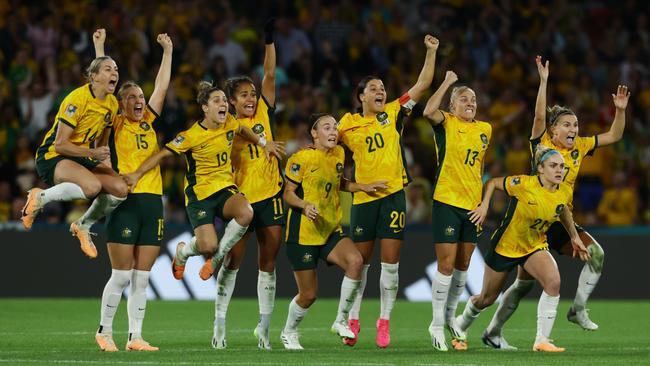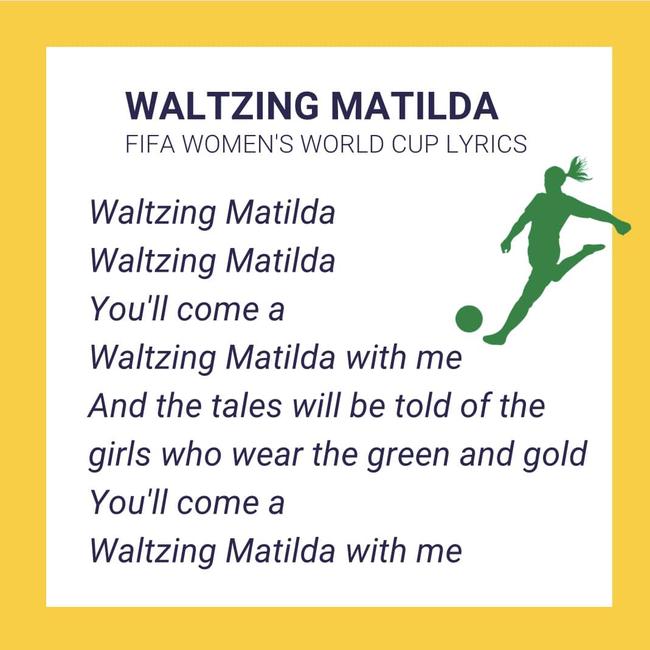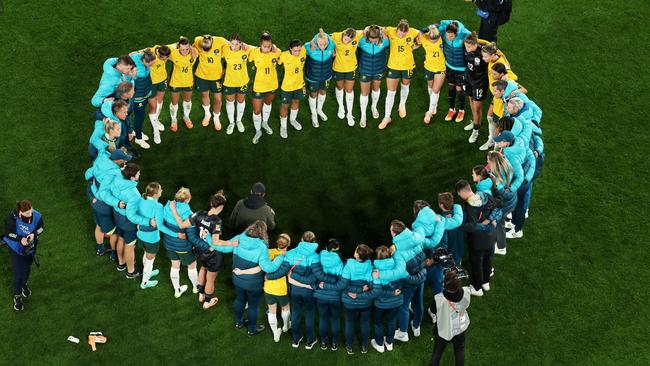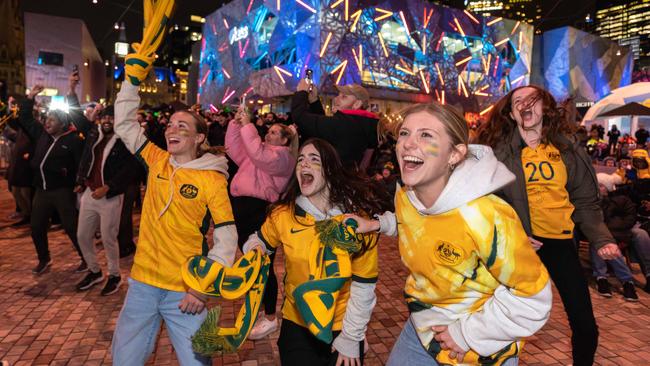Yeah the girls? Yeah the women? What are we allowed to call the Matildas?
Some keen Matildas fans have taken issue with the way we speak about our mighty soccer stars, accusing some supporters of being sexist.
World Cup
Don't miss out on the headlines from World Cup. Followed categories will be added to My News.
As Australia’s almighty Matildas stormed through the FIFA Women’s World Cup, cheers of “yeah the girls” echoed around the nation.
The catchphrase packed an extra punch at the end of the thrilling and historic quarter-final penalty shootout win against France, while Aussies belted it out again when Sam Kerr blasted an incredible goal in the fateful semi-final against England.
Even after the heartbreaking loss to the Lionesses, “yeah the girls” has emerged as a fist-pumping plaudit to express the pride Aussies feel for the history-making team.
But some fans have taken issue with how we have been speaking about the Matildas; or, more specifically, our ongoing references to them as “girls”.

Critics say calling the Matildas “girls” is disrespectful to the team and infantilises a group of professional athletes.
It is, at best, they say, dismissive and, at worst, it is deeply sexist.
This is despite the word being adopted en-masse as an affectionate catch-all for the team in casual conversation, in social media, even written into official cheer squad chants – one song declares “the Aussie girls / will beat the world”.
A fresh round of heated criticism has come for a fan’s attempt to rewrite the lyrics to the legendary Australian bush poem ‘Waltzing Matilda’.
The fan shared the tweaked lyrics on social media, ahead of the Matilda’s historic semi-final clash against England on Wednesday night, and urged Aussies to “sing it loud” for the team.
One line of the Banjo Patterson classic was changed to honour the team, switching out the line about the swagman watching his “billy boil”.
“And the tales will be told of the girls who wear the green and gold,” it reads.
“You’ll come a Waltzing Matilda with me.”

While some were quick to jump on board with the World Cup rewrite, one commenter wanted to correct the record.
“Women. They’re women. They’re professional female athletes and as far as I know they’re all adults,” they wrote.
“I’m starting to twitch every time I see ‘girls’ used to describe our adult female athletes. I know they use the term for each other but I don’t care.
“‘Girls’ when used by non-team members is loaded – it’s infantilising, it diminishes and I really, really want it to stop.”
The comment echoed the sentiments of others who argue even calling the Matildas “our girls” is “possessive … gendered and infantilising”.
A number of people said they were also irked by calling the Matildas “girls”, but seemingly as many were not bothered by such “petty hangups”.
“Pick your battles,” another commenter replied.
“It’s just a word and although there’s a choice in how it’s used, there’s also a choice in how you hear it.”

But, according to a number of think-pieces, it is a battle worth picking.
University of Sydney academic Victoria Rawlings told news.com.au Australia has an “ongoing struggle with the word ‘woman’”.
“I didn’t start using it until my 30s, and friends of mine still resist using ‘women’ or ‘woman’ as they were often used by the adults in our young lives as a pejorative,” Dr Rawlings said.
She said our discomfort with the female identifier leads us to use other words like “ladies” or “girls” – which can also carry the burden of being used against women.
But, she said, whether or not it is appropriate to “girl” the Matildas is all up to context.
“In short, it depends on the speaker, the place, the time, the words that accompany the use of ‘girls’, and the listener,” Dr Rawlings said.
“Words are given meaning by context; there are rarely fixed moral rules or meanings of singular words in common parlance. Instead, every word used is mediated by the speaker, the space and the listener.”

She said the way footballers – men and women – talk about “the boys” or “the girls” post-match shows a “friendly and affectionate team”. But in other settings the words may “diminish importance”.
But other think-pieces would argue the word “girl” is far more loaded than the word “boy” – this Guardian piece points to how doing something “like a girl” is meant to offend, but there is no equivalent for men.
University of Auckland sociology academic Toni Bruce told news.com.au it was important to consider whether the women were being named differently from men, and who was doing the naming.
“If female teams are referred to as ‘girls’ and male teams are referred to as ‘men’, this can infantilise and diminish female athletes,” Professor Bruce said.
She said “potential problems lie” if outsiders, particularly authority figures, start “girl”-ing the women.
“Sports organisations and media have a responsibility to use language that treats female athletes as adults to be taken seriously rather than sidelined as ‘less than’ men,” she continued.
“In the FIFA World Cup teams, even the youngest players have the right to be identified as women. Simultaneously, the players have to right to embrace a team identity as ‘the girls’.”
And, really, has there ever been a better time to let out an almighty “yeah the girls” than when our Matildas are making history time and time again at a World Cup on home soil? I think not.
So a very big yeah to the girls – especially when they go to battle it out against Sweden for third place on Saturday night in Brisbane.
Originally published as Yeah the girls? Yeah the women? What are we allowed to call the Matildas?




